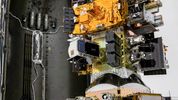We attended the Global Satellite Servicing Forum (GSFF) held in Washington DC last week. This annual event brought together key industry players and policy makers to discuss standards, policy and collaboration in order to drive the in-orbit satellite services and manufacturing. As we have discussed in our article “Looking Ahead at Space Exploration” in July, these areas are critical enablers for future space exploration. Below is a summary of four startups from the conference targeting this market and our key takeaways:
Summary of 4 In-Orbit Servicing and Debris Removal startups
- Effective Space Solutions is building small space drones that can dock with ageing GEO for Life Extension. The spacecraft can be adapted to service LEO and remove space debris by adding robotic capabilities.
- Novawurks is designing and building serviceable satellites by developing “modular” or “automobile” space parts to increase serviceability. The company sees opportunities for services through separable systems. Longer term, this approach would enable on-orbit payload assembly and manufacturing.
- Astroscale is focused on space debris removal for LEO. The risk of space collision is increasing with growing debris in orbit and thousands of smalls satellites planned for launch in the coming decade. Astroscale believes government intervention is crucial to make this a viable market.
- Orbit Fab is building a network of gas stations in space. It became the first startup to supply water to the International Space Station (ISS) early this year.
First, we are encouraged that the Defense Advanced Research Projects Agency (DARPA) thinks in-orbit satellite servicing is at an inflection point with technology readiness from an expanding commercial ecosystem; DARPA has been investing in their area for over twenty years. Space Logistics, a Northrop Grumman Strategic Venture, is scheduled to launch its first “Mission Extension Vehicle” (MEV) docked Life Extension for GEO any day now, making Commercial Satellite Servicing a reality near term with its first 5-year service contract with Intelsat.
In-Orbit Servicing and Assembly is one of the three common problems that brings together the Defense, Intelligence and Civilian community (Air Force, NRO and NASA) to work together. The other two are Small Satellites and Big Data. The Defense and Intelligence Community seek to increase the resilience of the US space infrastructure with satellite life extension and upgrade capabilities, while NASA’s strategic plan is to return to the moon for long-term exploration and use, as well as creating a base for eventually crewed missions to Mars and beyond.
According to recent NSR study, “In-Orbit Servicing” is ripe for growth as traditional satellite operators delay fleet investment decisions. The report forecasts $4.5 billion in cumulative revenues from In-Orbit Services by 2029. It expects Life Extension for GEO satellites to account for more than 75% of the market over the next ten years. As more small LEO satellites get launched, they became another market for in-orbit services. GEO Life Extension Vehicles can be adapted to do debris removal by adding robotic capabilities. Active debris and end-of-life removal greatly reduce the risk of collision with rapidly growing constellations in orbit.
However, satellite operators, who are the prospective customers, provided a different perspective to startups (Effective Space Solutions, Novawurks, Astroscale, Orbit Fab) pitching their solutions for GEO, LEO Satellite Servicing and Debris Removal. Satellite operators (SES and OneWeb) pointed out softer than expected commercial demand and questioned the value proposition. Most GEO satellites in orbit are designed primarily for TV broadcasting, which is slowing due to OTT (Over-the-Top). Operators are often more focused on launching new HTS GEO satellites for broadband/data than life extension of their fleet. In addition, life extension is far less attractive to lower-cost LEO satellites. Lastly, are operators willing to pay for space debris removal without any regulatory requirements?
While the government wants to leverage the private sector to commercialize this market, industry is seeking more government intervention to drive demand. Industry experts agree that the government can support this market by providing 1) regulation/mandate, 2) subsidies for launch and test, 3) commercial contracts.
In summary, the conference highlighted the importance of government and industry partnerships and the need for standards in opening up markets and informing regulation. This is why Seraphim Capital invested in LeoLabs and D-Orbit; startups with enabling technologies for in-orbit services. We believe Space Situation Awareness or timely and reliable Space Debris Mapping is one of the first steps in reducing the risk of collision and creating a viable and robust space economy. LeoLabs is a US based startup building a network of ground phased-array radars that can track assets and debris as small as 2 cm with frequent revisits. D-Orbit is based in Italy. It provides space taxis to transport CubeSats on shared rides to their most optimal orbits, and end-of-life decommissioning services.
 unknownx500
unknownx500











